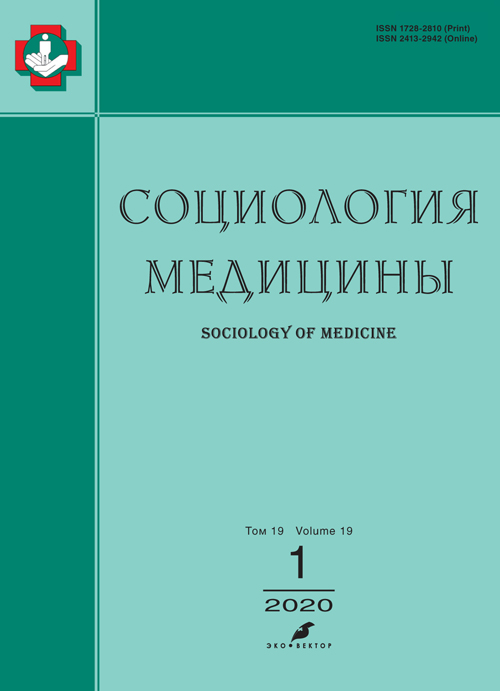Russian adaptation of “questionnaire for doctors and nurses’ views on people living with HIV/AIDS” and “comprehensive health staff questionnaire (for sentinel surveillance)” for russian-speaking medical professionals
- Authors: Suturina L.V.1, Kuzmin M.Y.1,2, Markova D.P.1, Atalyan A.V.1
-
Affiliations:
- Scientific Сentre for Family Health and Human Reproduction Problems
- Irkutsk State University
- Issue: Vol 19, No 1 (2020)
- Pages: 4-10
- Section: Articles
- URL: https://rjsocmed.com/1728-2810/article/view/50727
- DOI: https://doi.org/10.17816/1728-2810-2020-19-1-4-10
- ID: 50727
Cite item
Abstract
This study presents a step-by-step Russian adaptation of the “Questionnaire for doctors and nurses’ views on people living with HIV/AIDS” and “Comprehensive Health Staff Questionnaire (for sentinel surveillance)” for Russian-speaking audience of medical professionals. Based on the analysis of foreign and domestic studies, it is concluded that no specialized questionnaires on the stigmatization of people living with HIV (PLHIV) for health professionals are available. A sample of 250 medical workers of different levels (doctors and nurses) of Eastern Siberia is used for the step-by-step adaptation of questionnaires indicating the procedures for the compliance with the content validity, criteria validity, reliability, and reproducibility. Overall, the findings of this study indicate that the level of reliability of the Russian language version of the “Questionnaire for doctors and nurses’ views on people living with HIV/ AIDS” is sufficient: Cronbach’s alpha for this questionnaire was 0.72, and that of the “Comprehensive Health Staff Questionnaire (for sentinel surveillance)” was 0,77. At the same time, the high criteria validity of both questionnaires was established based on the correlation of the obtained questionnaire results. Therefore, these questionnaires can be used to evaluate the level of stigmatization of PLHIV among health professionals.
Keywords
Full Text
About the authors
Larisa V. Suturina
Scientific Сentre for Family Health and Human Reproduction Problems
Author for correspondence.
Email: mirroy@mail.ru
Dr. med. Sci., Professor, Head of the Reproductive Health Department
Russian Federation, IrkutskMikhail Y. Kuzmin
Scientific Сentre for Family Health and Human Reproduction Problems; Irkutsk State University
Email: mirroy@mail.ru
ORCID iD: 0000-0002-7538-8375
candidate of psychology Sciences, Researcher at the Laboratory of socially significant problems of reproduction, assistant professor
Russian Federation, Irkutsk; IrkutskDarya P. Markova
Scientific Сentre for Family Health and Human Reproduction Problems
Email: mirroy@mail.ru
laboratory assistant at the Laboratory of socially significant problems of reproduction
Russian Federation, IrkutskAlina V. Atalyan
Scientific Сentre for Family Health and Human Reproduction Problems
Email: mirroy@mail.ru
Cand. biol. Sci., Senior Researcher at the Laboratory of socially significant problems of reproduction
Russian Federation, IrkutskReferences
- Генич Е.В., Лещенко О.Я., Даренская М.А., Шолохов Л.Ф. Состояние нейроэндокринной регуляции и овариального резерва у ВИЧ-инфицированных женщин с репродуктивными нарушениями // Acta Biomedica Scientifica. — 2018. — Т. 3. — № 3. — С. 116–120. [Genich EV, Leshchenko OYa, Darenskaya MA, Sholokhov LF. Neuroendocrine regulation and ovarian reserve in HIV-infected women with reproductive disorders. Acta Biomedica Scientifica. 2018;3(3):116-20. (In Russ.)]. https://doi.org/10.29413/ABS.2018-3.3.18.
- Маркова Д.П., Сутурина Л.В. Проблема стигматизации ВИЧ-инфицированных пациентов со стороны медицинских работников: литературный обзор // Acta Biomedica Scientifica. — 2018. — Т. 3. — № 3. — С. 160–164. [Markova DP, Suturina LV. The problem of stigmatization of HIV-infected patients by the medical workers: literature review. Acta Biomedica Scientifica. 2018;3(3):160-4. (In Russ.)]. https://doi.org/10.29413/ABS.2018-3.3.25.
- Kelly JD, Reid MJ, Lahiff M, et al. Community-level HIV stigma as a driver for HIV transmission risk behaviors and sexually transmitted diseases in Sierra Leone: a population-based study. J Acquir Immune Defic Syndr. 2017;75(4):399-407. https://doi.org/10.1097/QAI.0000000000001418.
- Rogers SJ, Tureski K, Cushnie A, et al. Layered stigma among health-care and social service providers toward key affected populations in Jamaica and the Bahamas. AIDS Care. 2014;26(5):538-546. https://doi.org/10.1080/09540121.2013.844762.
- Rutledge SE., Abell N, Padmore J, McCann TJ. AIDS stigma in health services in the Eastern Caribbean. Sociol Health Illn. 2009;31(1):17-34. https://doi.org/10.1111/j.1467-9566.2008.01133.x.
- Henrickson M, Dickson N, Mhlanga F, Ludlam A. Stigma, lack of knowledge and prevalence maintain HIV risk among Black Africans in New Zealand. Aust N Z J Public Health. 2015;39(1):32-37. https://doi.org/10.1111/1753-6405.12301.
- Vorasane S, Jimba M, Kikuchi K, et al. An investigation of stigmatizing attitudes towards people living with HIV/AIDS by doctors and nurses in Vientiane, Lao PDR. BMC Health Serv. Res. 2017;17(1):125. https://doi.org/10.1186/s12913-017-2068-8.
- Незнанов Н.Г., Налезова Н.В., Колькова О.В., и др. К проблеме стигматизации пациентов с ВИЧ-инфекцией со стороны медицинских работников // Doctor.ru. — 2016. — № 4. — С. 49–54. [Neznanov NG, Nalezova NV, Kol’kova OV, et al. Stigmatization of patients with HIV by medical professionals. Doctor.ru. 2016;(4):49-54. (In Russ.)]
- Голенков А.В., Щербаков А.А. Сферы дискриминации ВИЧ-инфицированных (по результатам опроса медицинских работников) // Вестник Чувашского университета. — 2011. — № 3. — С. 327–334. [Golenkov AV, Shcherbakov AA. Spheres of discrimination against HIV-infected people (based on a survey of medical stuff). Vestnik Chuvashskogo universiteta. 2011;(3):327-334. (In Russ.)]
- Srithanaviboonchai K, Stockton M, Pudpong N, et al. Building the evidence base for stigma and discrimination-reduction programming in Thailand: development of tools to measure healthcare stigma and discrimination. BMC Public Health. 2017;17(1):245. https://doi.org/10.1186/s12889-017-4172-4.
- Aaronson N, Alonso J, Burnam A, et al. Scientific Advisory Committee of Medical Outcomes Trust. Assessing health status and quality-of-life instruments: attributes and review criteria. Qual Life Res. 2002;11(3):193-205. https://doi.org/10.1023/a:1015291021312.
- Wagner AC, Hart TA, McShane KE, et al. Health care provider attitudes and beliefs about people living with HIV: Initial validation of the Health Care Provider HIV/AIDS Stigma Scale (HPASS). AIDS Behav. 2014;18(12):2397-2408. https://doi.org/10.1007/s10461-014-0834-8.
- Nyblade L. A brief, standardized tool for measuring HIV-related stigma among health facility staff: results of field testing in China, Dominica, Egypt, Kenya, Puerto Rico and St. Christopher & Nevis. J Int AIDS Soc. 2013;16(3 Suppl 2):18718. https://doi.org/10.7448/IAS.16.3.18718.
- Boyes ME, Mason SJ, Cluver LD. Validation of a brief stigma-by-association scale for use with HIV/AIDS-affected youth in South Africa. AIDS Care. 2012;25(2):215-222. https://doi.org/10.1080/09540121.2012.699668.
Supplementary files







